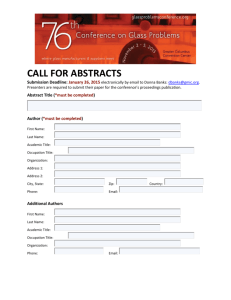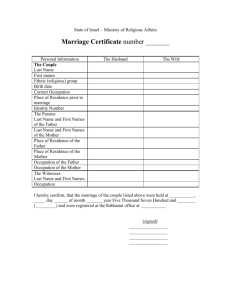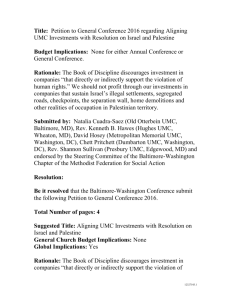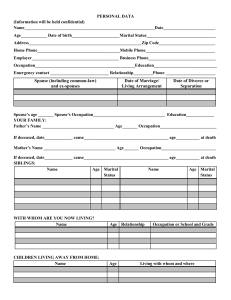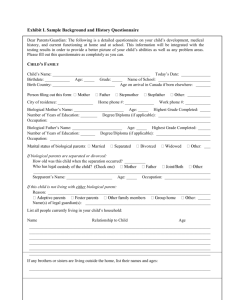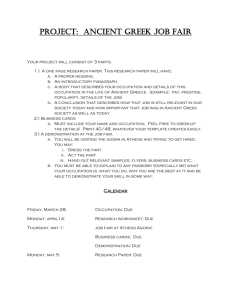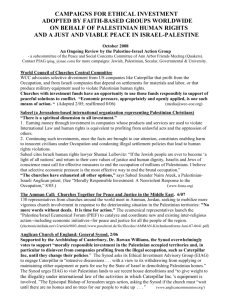Key Points to Remember 1. We are responding to a call from
advertisement
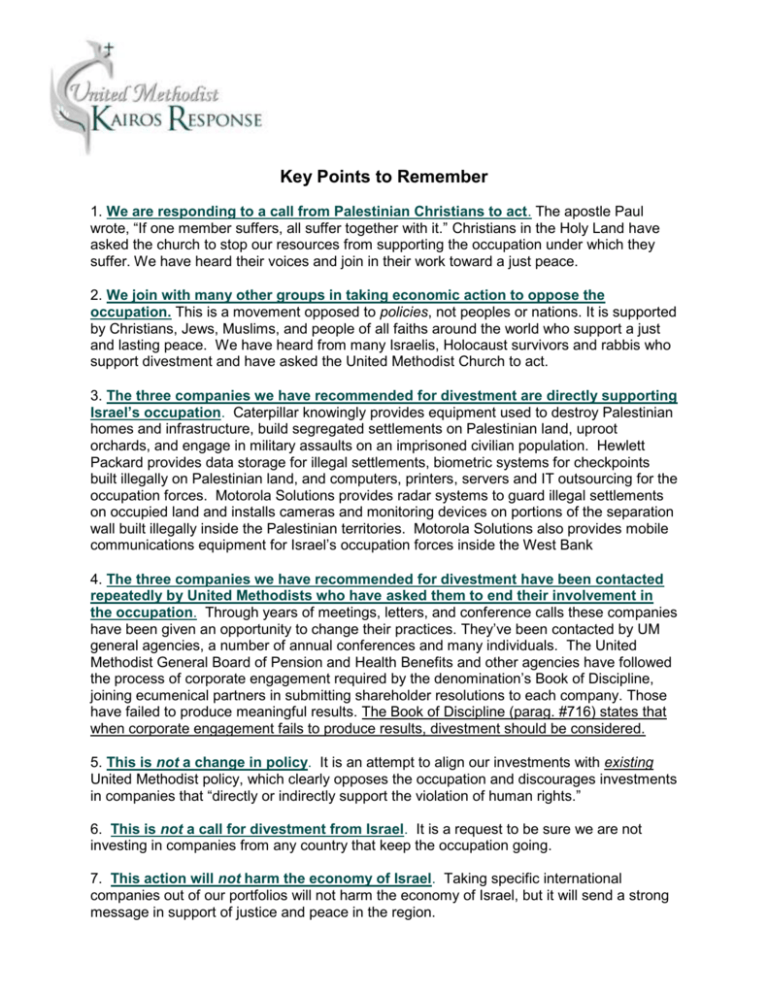
Key Points to Remember 1. We are responding to a call from Palestinian Christians to act. The apostle Paul wrote, “If one member suffers, all suffer together with it.” Christians in the Holy Land have asked the church to stop our resources from supporting the occupation under which they suffer. We have heard their voices and join in their work toward a just peace. 2. We join with many other groups in taking economic action to oppose the occupation. This is a movement opposed to policies, not peoples or nations. It is supported by Christians, Jews, Muslims, and people of all faiths around the world who support a just and lasting peace. We have heard from many Israelis, Holocaust survivors and rabbis who support divestment and have asked the United Methodist Church to act. 3. The three companies we have recommended for divestment are directly supporting Israel’s occupation. Caterpillar knowingly provides equipment used to destroy Palestinian homes and infrastructure, build segregated settlements on Palestinian land, uproot orchards, and engage in military assaults on an imprisoned civilian population. Hewlett Packard provides data storage for illegal settlements, biometric systems for checkpoints built illegally on Palestinian land, and computers, printers, servers and IT outsourcing for the occupation forces. Motorola Solutions provides radar systems to guard illegal settlements on occupied land and installs cameras and monitoring devices on portions of the separation wall built illegally inside the Palestinian territories. Motorola Solutions also provides mobile communications equipment for Israel’s occupation forces inside the West Bank 4. The three companies we have recommended for divestment have been contacted repeatedly by United Methodists who have asked them to end their involvement in the occupation. Through years of meetings, letters, and conference calls these companies have been given an opportunity to change their practices. They’ve been contacted by UM general agencies, a number of annual conferences and many individuals. The United Methodist General Board of Pension and Health Benefits and other agencies have followed the process of corporate engagement required by the denomination’s Book of Discipline, joining ecumenical partners in submitting shareholder resolutions to each company. Those have failed to produce meaningful results. The Book of Discipline (parag. #716) states that when corporate engagement fails to produce results, divestment should be considered. 5. This is not a change in policy. It is an attempt to align our investments with existing United Methodist policy, which clearly opposes the occupation and discourages investments in companies that “directly or indirectly support the violation of human rights.” 6. This is not a call for divestment from Israel. It is a request to be sure we are not investing in companies from any country that keep the occupation going. 7. This action will not harm the economy of Israel. Taking specific international companies out of our portfolios will not harm the economy of Israel, but it will send a strong message in support of justice and peace in the region. 8. This action will not harm investors. It will not violate the fiduciary responsibilities of UM investment managers to their beneficiaries. The investment funds will simply be switched to other companies. (The board has already divested from some companies that support the occupation without damaging investors. Investment managers actually protect investors when they switch money away from companies receiving global criticism.) 9. The United Methodist Church will not lose money by divesting from companies that sustain Israel’s occupation. In fact, it’s just the opposite. Church funds are shielded when they are removed from companies that are widely condemned for their actions. A company called Veolia, which is in our pension portfolio, has lost billions of dollars in contracts as a result of its involvement in the occupation. The stock value has fallen significantly as municipalities around the world rejected Veolia services. Motorola lost sales during a global campaign called “Hang Up on Motorola” because of its role in the occupation. The General Board of Pension and Health Benefits web site says that Caterpillar’s “policies expose Caterpillar - and by extension, its shareholders - to reputational and financial risk.” In other words, we are upholding our fiduciary responsibility to shareholders by seriously considering this step. Divesting is a smart move financially and an essential move morally for the church. 10. This action will not harm Palestinians. The divestment campaign was launched by Palestinians themselves in July, 2005. It was urgently called for in the Kairos Palestine Document issued by Palestinian Christians in 2009. The three main Palestinian labor unions have all endorsed the call for divestment. Many of the companies operating in the settlements employ only Israeli workers or place Palestinians in the lowest paying jobs. Palestinians value their freedom more than any of the menial jobs brought about by Israel's occupation, which destroys their land and takes their water and resources for Israeli use. 11. “Positive Investment” in the Palestinian economy can never succeed while the occupation continues. As long as companies we invest in are strangling the opportunity for growth and stability in the occupied territories, putting more money into businesses there is futile. It is designed to make us feel good while avoiding the key issue of the occupation. No economy can prosper without freedom of movement for workers and goods, reliable affordable water, and access to markets and raw materials. The occupation denies all these to Palestinians. Only by combining investment in Palestine with divestment from companies that profit from the occupation will we make a difference. 12. Divestment has worked in the past, and it can work again. In the 1980s, the United Methodist General Board of Pension and Health Benefits divested $77 million from companies doing business in South Africa. GBPHB was part of a global divestment movement that helped end apartheid. Once again, we have the opportunity for our investment decisions to help bring an end to human rights abuses. 13. Selective divestment is consistent with the United Methodist commitment to a just and sustainable peace for all the people of the Middle East. Peace can never come to the region until violations of human rights are ended. Investors can hasten this by refusing to invest in companies that take part in these violations. 14. This is a global justice movement that will succeed in ending the occupation. The United Methodist Church has to decide now whether it will be a bystander or be true to its tradition of prophetic justice in cutting its ties to a situation it has declared overwhelmingly (by a General Conference vote of 98%) that it wants to end. (GC Res. #312, 2004)
